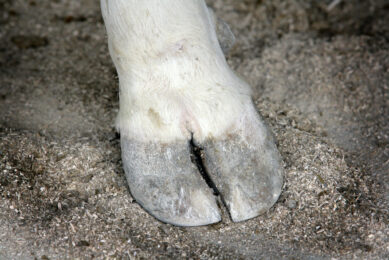Covid-19 may cause shortage of labour in NA pork sector

Although pigs are not directly impacted by the coronavirus disease 2019 (Covid-19), the global pandemic does affect swine production in a multitude of different ways. In the USA and Canada, like in many other places in the world, society lockdowns cause a sudden shortage of foreign workers. How are the countries’ swine businesses dealing with this?
Each year in the United States and Canada, tens of thousands of temporary foreign workers are brought in to work in meat processing plants and on farms. This year, due to Coronavirus disease 2019 (Covid-19), there are serious concerns that the same number of workers will not be allowed to enter, putting food production, business survival and food security at risk in these 2 countries.
Suspending temporary work – and removal of that rule
It’s a situation that’s changing by the day. On Tuesday March 24, the US State Department announced it would suspend the processing of temporary work (H-2A) visas in Mexico because of Covid-19 concerns. However, by Friday 27th, the suspension was removed.
That was at least partly due to a letter sent to State Department, the Department of Labor and the Department of Homeland Security from elected officials in North Carolina but also signed by over 100 members of Congress. On Friday afternoon, secretary of state Mike Pompeo recognised in a tweet that “H-2 visas are essential to our economy and food security. I am taking decisive action to keep visas flowing.”
H-2 visas are essential to our economy and food security. I am taking decisive action to keep visas flowing while keeping our team safe. Read more on the @TravelGov website: https://t.co/5ggfph57At
— Secretary Pompeo (@SecPompeo) March 27, 2020
Hog farmers using seasonal visas
Year-round but only to some extent, the US pork industry is able to use a programme involving ‘H-2A’ seasonal visas, but hog farmers mainly use the ‘TN’ visa programme, which specifically involves Mexican workers. TN stands for ‘Trade NAFTA,’ and is a special US non-immigrant worker classification that offers expedited work authorisation to workers from Canada and Mexico to enter and work in the US, as outlined in the North American Free Trade Agreement (NAFTA).
The National Pork Producers Council (NPPC) noted that US pork production has already been suffering from a labour shortage both on farms and in packing plants, and is concerned that the pandemic may severely exacerbate this challenge. “Further disruption to our labour force as a result of this outbreak will harm our production,” said NPPC spokesperson Rachel Gantz, “and could increase production costs and food prices for consumers.”
Stay up-to-date with Covid-19 impact on pig production
Can US workers be employed on pig farms?
As to whether US workers can be recruited to fill some of these jobs, should not enough workers be able to come from Mexico and other countries under H-2A and TN visas, Gantz first noted that economists at Iowa State University say ‘no’. These economists used a study from the US Department of Agriculture’s Economic Research Service (ERS) and concluded that a reduction in the foreign work force will not be offset by American residents.
Gantz added, “There are now more than 3.3 million Americans on unemployment and as one of 16 essential service industries, the US pork industry is hiring for a range of positions from animal care to transportation. We are working to ensure an uninterrupted supply of high-quality and affordable protein to America’s kitchens and offer solid wages and benefits. However, most Americans don’t live near our farms or packing plants and therefore we are increasingly relying on a foreign-born workforce.”
Visa reform for non-seasonal livestock agriculture
While NPPC is no doubt relieved by the State Department’s recent removal of the H-2A processing suspension, it also hopes that agricultural TNs will soon be a priority. On Friday, March 27th, Gantz said, “On Thursday March 26, NPPC wrote to US Secretary of State Mike Pompeo, urging help with the situation. NPPC will also continue to work with Congress on visa reform for non-seasonal livestock agriculture. We need a larger pool of foreign-born workers to help ensure an uninterrupted supply of US pork to consumers here at home and around the globe.”
North American pork exports to China have risen significantly since the African Swine Fever outbreak began. Gantz noted that without much-needed reform to support a viable workforce for US agriculture, animal welfare could be jeopardised and production costs will increase, leading to higher food prices.
Temporary foreign worker situation in Canada
Similar problems exist on the other side of the border. Jean-Michel Laurin, president & CEO of the Canadian Poultry & Egg Processors Council provided some insight on the national temporary foreign worker situation in the context of Covid-19.
Laurin reported that discussions last held among the Canadian Federation of Agriculture, the Quebec farmer’s union and Agriculture & Agri-food Canada (AAFC) relating to strict protocols to which AAFC expects all farming and food processing sectors to adhere with regard to foreign workers this year.
These protocols likely include medical screening before and after the flight to Canada, private transportation to accommodations and a 14-day quarantine period. Laurin said there may also be the opportunity for foreign workers now in Canada to extend their stay if they are willing and able to do so.
Managing foreign farm worker health and movement
Meanwhile, Joel Sotomayor, the co-founder of Ontario-based Transport Genie is working (through his other company JRS Virtual Studio) with Dr Karen Hand at Strategic Solutions Group to produce technology that can help manage foreign worker health and movement.

Read more on Transport Genie in earlier reports here
The companies are ready to pilot a Radio Frequency Identification (RFID)-based system so that temporary foreign worker movements could be managed in order to quickly get Covid-19-related medical attention for them and/or take the wisest quarantine measures. Workers would wear RFID bracelets and RFID readers would be placed at various points in processing plants or on farms.
Sotomayor said this may save a processing plant or farm from having to shut down completely and Hand noted that it may also enable labour to be shared among farms, depending on available skill sets and needs. Currently, temporary workers are permitted to only work at the processing plant or farm specified on their permits.
North American plants applying strict checks
To illustrate the effects of Covid-19 on the working situations in North America, one can look at a recent message by Canadian pork processor Olymel, which temporarily closed its pork processing plant in Yamachiche, QC, Canada, about 150km from Montreal, after 9 out of nearly 100 employees were confirmed to have Covid-19.
Similarly, Perdue Farms confirmed in a news release that a worker at a site in Perry, GA, United States had tested positive for Covid-19. The worker is an employee of the further processsing facility, where both pork and poultry are processed. The employee had not been to work for more than a week, according to the statement. As a result, the company immediately enacted strict health protocols.











